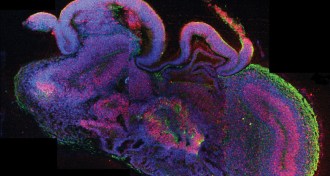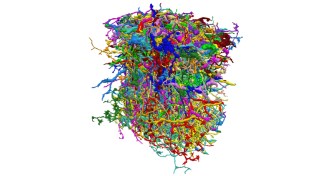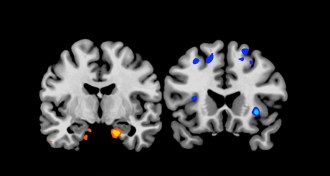
Laura Sanders reports on neuroscience for Science News. She wrote Growth Curve, a blog about the science of raising kids, from 2013 to 2019 and continues to write about child development and parenting from time to time. She earned her Ph.D. in molecular biology from the University of Southern California in Los Angeles, where she studied the nerve cells that compel a fruit fly to perform a dazzling mating dance. Convinced that she was missing some exciting science somewhere, Laura turned her eye toward writing about brains in all shapes and forms. She holds undergraduate degrees in creative writing and biology from Vanderbilt University in Nashville, where she was a National Merit Scholar. Growth Curve, her 2012 series on consciousness and her 2013 article on the dearth of psychiatric drugs have received awards recognizing editorial excellence.

Trustworthy journalism comes at a price.
Scientists and journalists share a core belief in questioning, observing and verifying to reach the truth. Science News reports on crucial research and discovery across science disciplines. We need your financial support to make it happen – every contribution makes a difference.
All Stories by Laura Sanders
-
 Animals
AnimalsRats induced into hibernation-like state
Injection of compound causes animals to slow heartbeat, lower body temperature.
-
 Neuroscience
NeuroscienceVideo game sharpens up elderly brains
Adults over 60 who played for several hours a month beat untrained 20-year-olds in racing game.
-
 Health & Medicine
Health & MedicineDon’t stand so close to me
Personal space has a measurable boundary, a study suggests.
-
 Life
LifeTiny human almost-brains made in lab
Stem cells arrange themselves into a version of the most complex human organ.
-
 Humans
HumansBabies learn words before birth
Brain responses suggest infants can distinguish distinct words from altered versions that they learned in the womb.
-

Calling neuroscience pointless misses the point
Despite the adage, there actually is such a thing as bad publicity, a fact that brain scientists have lately discovered. A couple of high-profile opinion pieces in the New York Times have questioned the usefulness of neuroscience, claiming, as columnist David Brooks did in June, that studying brain activity will never reveal the mind. Or […]
-
 Psychology
PsychologyBlood marker may predict suicide
People who killed themselves had higher levels of a gene involved in cell death.
-
 Health & Medicine
Health & MedicineRacial homogeneity in early childhood may affect brain
In lab study, kids who lived in single-race orphanages have difficulty interpreting emotions on faces with foreign features.
-

-
 Neuroscience
NeuroscienceCaffeine shakes up growing mouse brains
When pregnant mice consumed caffeine, their offspring had altered neurons and faulty memory.
-
 Neuroscience
NeuroscienceOne sleepless night weakens resolve in the face of doughnuts
Sleep loss changes brain activity and food preferences.
-
 Health & Medicine
Health & MedicineSpace-mapping neurons found in human brain
Grid cells may orient people in Euclidean space.